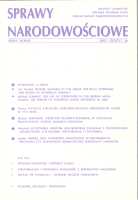Problem terytorializmu i podwójnej tożsamości z perspektywy Macedonii w XX wieku
The question of territorialism and double identity. From the perspective of the 20th century Macedonia
Author(s): Jolanta SujeckaSubject(s): Cultural Essay, Political Essay, Societal Essay
Published by: Instytut Slawistyki Polskiej Akademii Nauk
Summary/Abstract: As seen in texts from the 1920s by the representatives of the Macedonian diaspora in Bulgaria (Kriste Misirkov, Arseni Jovkov), consciousness of ties to a territory is not only primary but appears also to be dominant. An awareness of the territorial identity is evident in a slogan from a banner of the Ilidenian Uprising of 1903: “öĺëîęóďíŕ Ěŕęĺäîíčjŕ” (Integral Macedonia) and it grows whenever a solution to the Macedonian Problem, as a negative legacy of the Eastern Question, appears impossible or unsatisfactory. For the representatives of the Macedonian diaspora of the 1920s (K. Misirkov, A. Jovkov) and 1930s (Angel Dinev, Vasil Ivanovski), United Macedonia, that is a political structure corresponding to the “Integral Macedonia” slogan, has a value of its own. Therefore, the solutions for the Macedonian Problem proposed by the representatives of the diaspora in that period combine an awareness of both territorial and ethnic identities. The idea of interesting Europe in the creation of a buffer state in the Balkans, a counterpart of Switzerland, originates from the same incentives that earlier motivated K. Misirkov to propose his project of the “Ido” language, which was a specific Macedonian variant of Esperanto. For both Macedonia as the Switzerland of the Balkans and the “Ido” language pertain to the Macedonians' awareness of a territorial bond. Two ideas and slogans with the same historical provenance, “Integral Macedonia” and “Macedonia for the Macedonians,” confirm a regional bond and thus a specific type of Macedonian separatism. They are connected with the issue of double identity. The time of the Second World War and the post-war period gave the two notions a totally new meaning. Their interpretation and analysis would allow the presentation of the axiological net determining the semantics of the notions Macedonia and a Macedonian, and at the same time they would make it possible to understand the complicated problems of the Macedonian-Bulgarian, Macedonian-Serbian, and Macedonian-Albanian borderlands.
Journal: Sprawy Narodowościowe
- Issue Year: 2005
- Issue No: 26
- Page Range: 157-165
- Page Count: 8
- Language: Polish

